Based on belief, there are 6 types of people mentioned in the Holy Quran. Explore their qualities and spiritual outcomes for self-reflection and guidance.
Table of Contents
Introduction
The Holy Qur’an is the final divine revelation of Almighty Allah. It not only provides guidance on worship and law but also paints a profound picture of the different kinds of people concerning the faith.
The Qur’an broadly classifies people into six main types based on belief, each with distinct qualities and outcomes. In addition, it also honours a special group — the Truth Seekers — who, while not a separate category, are acknowledged for their sincerity and openness to guidance.
The classification is deeply rooted in truth, justice, and compassion.
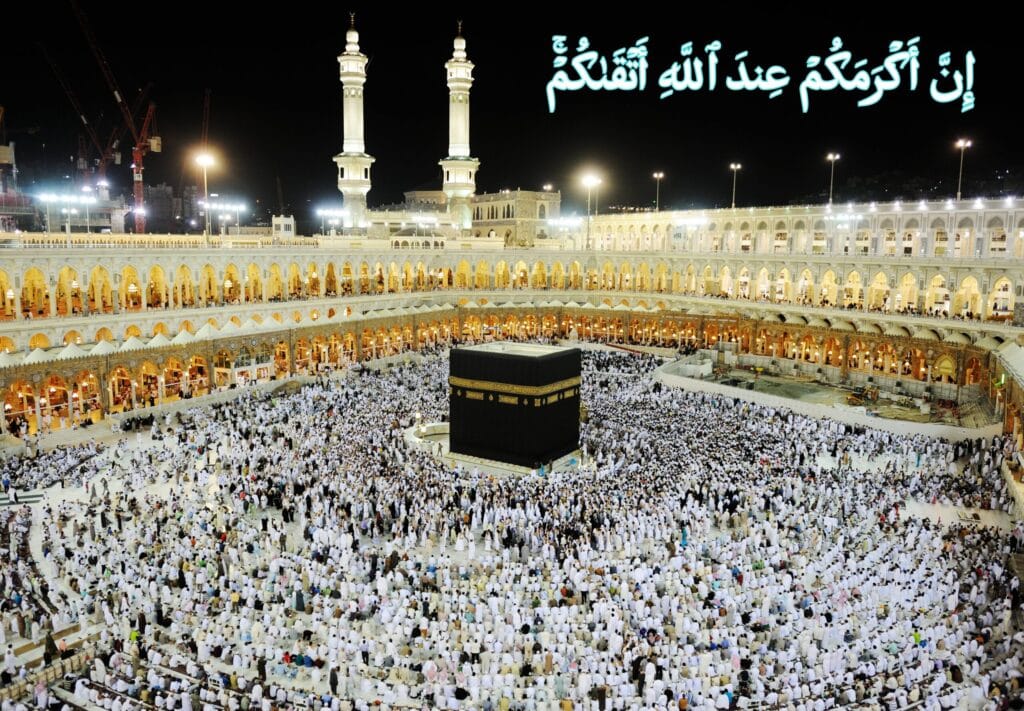
The Wisdom of Categorisation
The categorisation of the Qur’an is not about division, but about clarifying spiritual states based on belief. It simply provides clarity about the human spiritual condition. Each category serves as both a mirror and a lesson.
The categorisation urges readers to examine where they stand and what path they are or should be taking. It encourages believers to remain steadfast and invites non-believers to explore faith with sincerity.
Purpose of Understanding These Categories
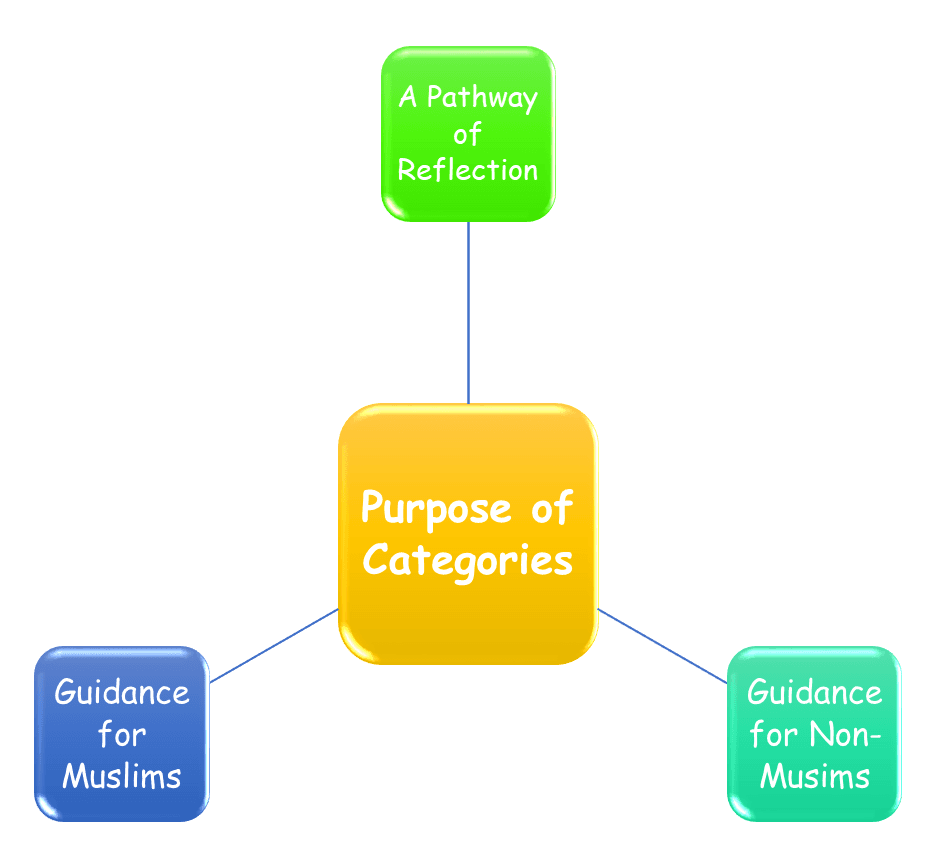
i. A Pathway of Reflection
The purpose of this categorisation is not about labelling people harshly. It offers pathways of reflection and self-assessment.
ii. Guidance for Muslims
For Muslims, these verses serve as a reminder to renew their faith, deepen their sincerity, and remain steadfast in the face of challenges.
iii. Guidance for Non-Muslims
For non-Muslims, the classification of the Qur’an provides clarity about what Islam calls for:
- to believe in
- Only One Supreme Creator (Tawhid)
- Prophets (PBUT)
- Angles
- Holy Books
- Day of Judgment
- Qadr
- to cultivate sincerity of heart
- to perform righteous actions
6 Types of People Mentioned in the Holy Quran
The Qur’an identifies 6 types of people based on belief, each with unique characteristics and spiritual outcomes.
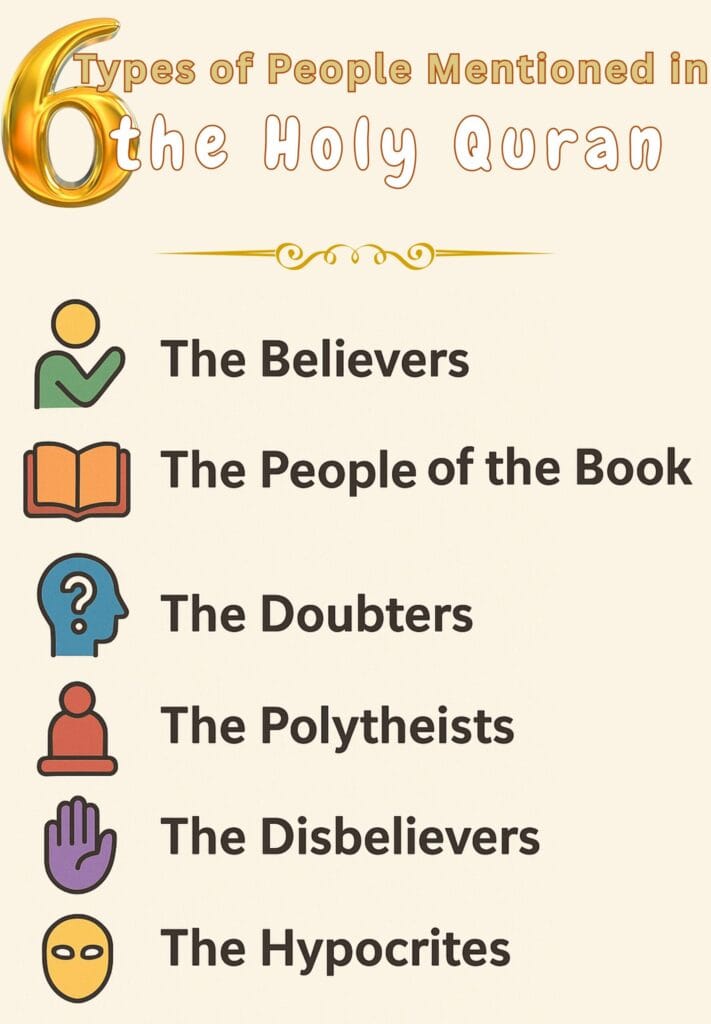
Hierarchy of Spiritual Rank
- In Islam, the highest rank belongs to those with the greatest piety.
- Those who reject truth knowingly occupy the lowest ranks.
Let’s learn about each of these spiritual ranks one by one.
1. The Believers (Al-Mu’minun)
The Highest Rank
The believers occupy the highest position in Islam. A believer is a person who
- acknowledges the only one supreme Lord
- offer prayers consistently
- gives charity generously
- fasts sincerely
- orients their heart toward the Hereafter rather than this fleeting world
This rank is given to them for their sincere faith and piety. They are described in the Qur’an as those who
- live by submission to Allah
- constantly remembering Him
- striving to live righteously
Their belief is not limited to words but manifests in action, humility, and obedience.

The Value of Piety (Taqwa)
The reason they are ranked highest is that piousness (taqwa) is the most valued quality in the sight of Allah. As stated in the Holy Qur’an:
“O mankind, indeed We have created you from male and female and made you peoples and tribes that you may know one another. Indeed, the most noble of you in the sight of Allah is the most righteous of you. Indeed, Allah is Knowing and Acquainted.”
Surah Al-Hujurat (49:13)
The verse clearly states that the most honoured among people are those with the most God-consciousness.
Believers recognise that life is a test and strive daily to purify their intentions. They do not consider faith as an inherited label. For them, it is an active journey of the heart, mind, and soul. Their rank reflects their closeness to God and their role as an example for others.
Qualities of the Believers
In practice, believers are described in the Qur’an as those whose hearts find peace in the remembrance of Allah (13:28).
“Those who have believed and whose hearts are assured by the remembrance of Allah. Unquestionably, by the remembrance of Allah, hearts are assured.”
Surah Ar-Ra’d (13:28)
Are Believers Perfect?
No! There is not a single believer who claims to be perfect. They can also do wrong, but when they err, they seek forgiveness sincerely and resolve to correct themselves. This humility elevates them above others. They do not live by arrogance but by submission to divine guidance.
Lessons
- For Muslims
These descriptions serve as a guide for daily life, reminding them to embody faith not only in words but in deeds.
- For Non-Muslims
This image of the believer demonstrates that Islam emphasises sincerity, ethical conduct, and love for God, far beyond mere ritual.
2. The People of the Book (Ahl al-Kitab)
Respected for Their Faith Tradition
The People of the Book come next because they were recipients of earlier revelations. They share a common heritage of monotheism, although some among them may have altered or misinterpreted scripture; but many still live with sincerity and devotion to God.
The Qur’an acknowledges this when it praises those among them who are humble and recognise the truth. Their acknowledgment of God places them closer to Islam than outright disbelievers or idolaters.

Reasons for Their Ranking
They are ranked here because of their proximity to Islamic teachings and their recognition of Allah’s oneness, even if incomplete.
“You will surely find the most intense of the people in animosity toward the believers [to be] the Jews and those who associate others with Allah [idolaters]; and you will find the nearest of them in affection to the believers those who say, ‘We are Christians’. That is because among them are priests and monks, and because they are not arrogant.”
Surah Al-Ma’idah (5:82)
The verse points out that some among them are closer to Muslims in affection, especially those who are humble and sincere.
The Qur’an even acknowledges that among the People of the Book are those who dedicate their nights in prostration and tears when they recognize the truth.
“They are not [all] the same; among the People of the Scripture is a community standing [in obedience], reciting the verses of Allah during periods of the night and prostrating [in prayer]. They believe in Allah and the Last Day, and they enjoin what is right and forbid what is wrong and hasten to good deeds. And those are among the righteous. And whatever good they do, never will it be removed from them. And Allah is Knowing of the righteous.”
Surah Al -Imran (3:113-115)
This shows that Islam values their sincerity and piety where it exists.
Historical and Social Context
Historically, Muslims lived alongside Jews and Christians for more than 1000 years under Islamic rule with rights and protections. The Qur’an acknowledges both their flaws and virtues, but places emphasis on fairness and coexistence.
Lessons
- For Muslims
This encourages respectful dialogue and unity where possible, grounded in justice and recognition of shared values.
- For Non-Muslims
It shows that Islam values sincerity and righteousness, even outside its community. Their placement in rank illustrates that God recognises sincerity wherever it is found, even if it has not reached the completeness of Islam.
Notable Mention | The Truth Seekers (Al-Haqq)
The Transitional Stage
The Holy Qur’an also acknowledges and honours those who are actively searching for truth. Though not classified as a separate type, they hold a special place due to their sincerity and openness.
“As for those who strive in Our cause, We will surely guide them to Our ways.”
Surah Al-Ankabut (29:69)

“Those who listen to what is said and follow the best of it — they are the ones Allah has guided.”
Surah Az-Zumar (39:18)
These verses show that Truth Seekers are on a hopeful path. Unlike the doubters who hesitate, Truth Seekers actively pursue clarity and sincerity.
3. The Doubters and the Misled (Al-Murtabun)
Between Faith and Rejection
The doubters hold a middle position because they neither fully embrace faith nor outright reject it. They are caught in uncertainty. They recognise signs of truth but fail to commit due to hesitation, pride, or distractions. Their wavering prevents them from achieving the clarity and peace of true faith.
The Qur’an often describes them as standing between two worlds. They are drawn to the truth but unable to let go of worldly attachments.

Reasons for Their Ranking
They are placed here because doubt reflects weakness of conviction, yet it is not as severe as outright rejection. The Holy Qur’an describes them as people who remain in doubt until the Hour overtakes them.
“And those who disbelieve will not cease to be in doubt about it until the Hour comes upon them unexpectedly or there comes to them the punishment of a barren Day.”
Surah Al-Hajj (22:55)
Unlike disbelievers who actively deny truth, doubters are often passive. They are mainly consumed by indecision. Their rank reflects two possible outcomes:
- Potential for salvation if they embrace faith
- The danger of hellfire if they remain in limbo
The Human Struggle of Doubt
This category speaks directly to the human psychological condition. Many people in the modern world are plagued by doubt due to misinformation from the media, distractions due to worldly charm, or cynicism.
Lessons
- For Muslims
The verses about doubt serve as reminders to strengthen their faith through knowledge, prayer, and reflection.
- For Non-Muslims
It highlights the importance of seeking clarity and courageously following the truth once it is recognised. Doubt is not condemned as harshly as disbelief, but it is still a dangerous state that can lead one away from divine mercy if not resolved.
4. The Polytheists (Al-Mushrikun)
Grave Misguidance
The polytheists are placed lower because they commit shirk. Shirk is the act of associating partners with Allah. This is described as the gravest sin in Islam since it denies the foundation of divine oneness.
Unlike doubters, polytheists actively direct worship away from God, distorting the natural inclination toward His oneness. Their devotion to idols, humans, or other beings takes them away from recognising the one Creator.
Idolatry is the only sin for which God (Allah) shows neither forgiveness nor mercy – if one dies like that.
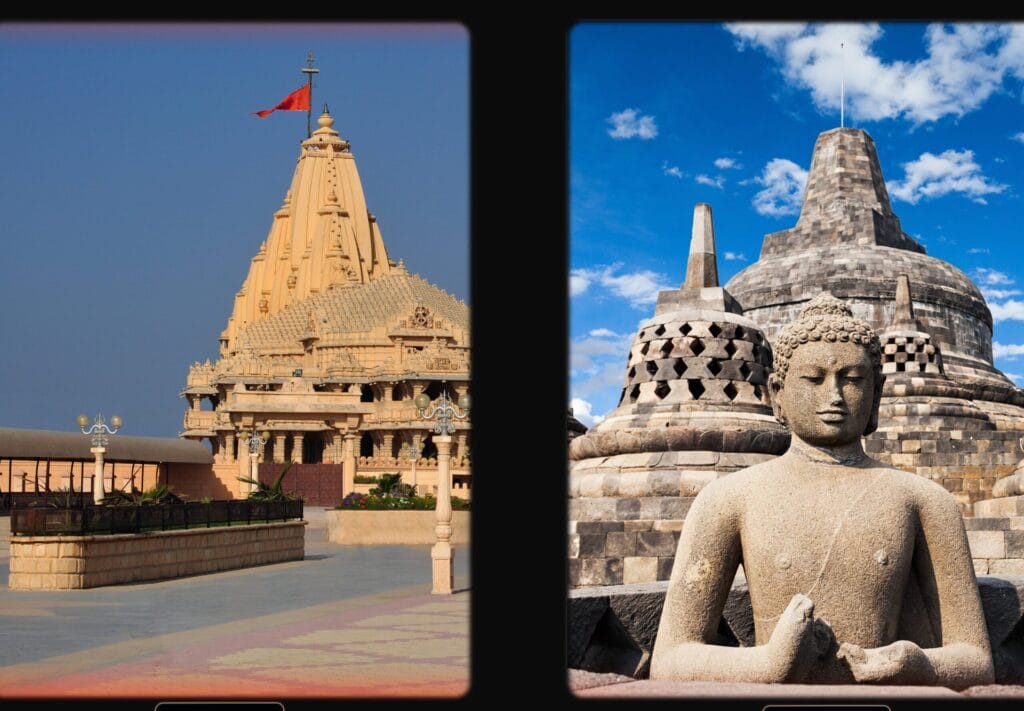
Reasons for Their Ranking
They are ranked here because shirk is considered an injustice against the soul and God Himself.
“And [mention, O Muhammad (PBUH)], when Luqman said to his son while he was instructing him, ‘O my son, do not associate [anything] with Allah. Indeed, association [with Him] is a great injustice’.”
Surah Luqman (31:13)
The Qur’an consistently emphasises that Allah does not forgive association with Him if a person dies in that state.
“Indeed, Allah does not forgive association with Him, but He forgives what is less than that for whom He wills. And he who associates others with Allah has certainly fabricated a tremendous sin.”
Surah An-Nisa (4:48)
Their rank reflects the seriousness of misdirected worship and the harm it causes both spiritually and socially. By worshiping powerless beings rather than submitting to the true Sustainer, they enslave themselves to illusions.
Spiritual and Social Consequences
When people worship others besides Allah, they harm their bond with their Creator. They place their trust in things that have no real power. This creates false systems of dependence. It also weakens personal responsibility. In the end, it divides people instead of uniting them under one God.
Lessons
- For Muslims
The warnings against shirk remind them to maintain the purity of monotheism. The Prophet Muhammad (peace be upon him) warned his companions of even subtle forms of shirk, such as doing deeds for show.
- For Non-Muslims
Islam speaks to the idolaters and urges them to think about what they worship and ask themselves:
Do we give devotion to what truly gives life and sustains creation?
Islam teaches that there is only one God, Allah. Only He deserves worship. Turning to anything else brings emptiness. In the end, it leads to loss and failure.
5. The Disbelievers (Al-Kafirun)
Those Who Reject Truth Knowingly
Disbelievers are ranked even lower because they reject God’s truth knowingly after it has reached them. The Qur’an often describes them as people whose hearts, eyes, and ears are closed to guidance.
A disbeliever’s rejection stems not from ignorance but from arrogance and attachment to worldly desires. They are not merely mistaken, but consciously resistant to divine truth.
Abu Jahl stands as a prime example of a disbeliever. Despite witnessing clear signs of truth and hearing the Prophet’s (PBUH) message directly, he chose to reject Islam out of arrogance and pride. His response reflects the Qur’anic description of those who, even after recognising the truth, deliberately turn away from it.

Reasons for Their Ranking
They are placed here because deliberate rejection is more severe than misguided worship. While polytheists may be misled into false worship, disbelievers actively deny the truth despite recognising its clarity.
“Indeed, those who disbelieve — it is all the same for them whether you warn them or do not warn them — they will not believe. Allah has set a seal upon their hearts and their hearing, and over their vision is a veil. And for them is a great punishment.”
Surah Al-Baqarah (2:6-7)
This highlights that for some disbelievers, faith will never penetrate due to their stubbornness. Their rank also reflects the consequences of closing one’s heart to guidance.
The Nature of Rejection
Their refusal is not simply a lack of awareness; it is a conscious decision to turn away from what has been made clear. This highlights the gravity of arrogance and pride. It blocks the spiritual growth and distances an individual from divine mercy.
Lessons
- For Muslims
This warns against arrogance and hardening of the heart, reminding believers to remain humble and receptive to guidance.
- For Non-Muslims
It emphasises the importance of humility and openness in seeking truth. It is one thing to not know the truth, but another to reject it when it becomes clear. This is why disbelievers are placed below polytheists in terms of spiritual rank.
Disbelief is not just about ignorance; it is about refusal.
6. The Hypocrites (Al-Munafiqun)
The Lowest Rank
The hypocrites are placed at the lowest level because their deception harms both themselves and the community.
Unlike disbelievers, who openly reject truth, hypocrites pretend to believe while secretly harbouring disbelief. Their duplicity undermines trust and spreads corruption among believers. Their outward display of faith hides inner rejection. This makes them far more dangerous than outright disbelievers.

Reasons for Their Ranking
They are ranked lowest because hypocrisy combines two attributes:
- Disbelief
- Deceit
The Qur’an states that hypocrites will be in the lowest depths of Hell, highlighting the severity of their condition.
“Indeed, the hypocrites will be in the lowest depths of the Fire — and never will you find for them a helper.”
Surah An-Nisa (4:145)
The insincerity of hypocrites makes them more dangerous than open rejection. While disbelievers are honest about their denial, hypocrites exploit religion for worldly gain. They destabilise the community from within.
The Dangers of Hypocrisy
Hypocrisy erodes unity, destroys trust, and corrupts the moral fabric of society. It is condemned because it misrepresents faith and prevents communities from flourishing in sincerity and justice.
Lessons
- For Muslims
This serves as a stern reminder to purify intentions and avoid superficial faith, striving for sincerity in both words and deeds.
- For Non-Muslims
It demonstrates insistence on honesty and the sincerity of Islam. It also shows that true faith cannot be faked or lived dishonestly. The hypocrites’ placement at the bottom reflects the profound harm of insincerity and betrayal.
Other Types of People Mentioned in the Holy Quran
Besides the categorisation of people based on belief, the Holy Qur’an also describes people based on:
- Deeds
- Character
- Social Role
- Response to Revelation
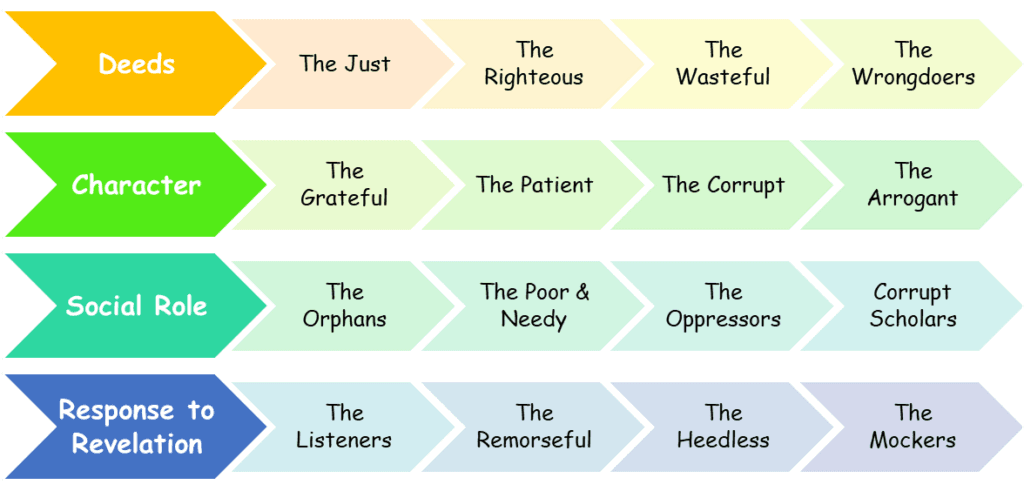
These additional classifications expand our understanding of human nature. It provides us with valuable lessons for reflection.
By Deeds
Human beings are also defined by their actions:
- The Righteous / Doers of Good (Al-Muhsinun, As-Salihin), who strive for justice and kindness (Surah Al-Ma’idah 5:51).
- The Wrongdoers (Az-Zalimun), who oppress themselves and others (Surah Al-Isra 17:27).
- The Wasteful (Al-Musrifun), who squander blessings (Surah Al-Isra 17:27).
- The Just (Al-Muqsitun), who uphold fairness even in hardship (Surah Al-Hujurat 49:9).
By Character
The Qur’an highlights both noble and blameworthy traits:
- The Grateful (Ash-Shakirin), who thank Allah in prosperity and adversity (Surah Saba 34:13).
- The Patient (As-Sabirun), who endures hardship with steadfastness (Surah Al-Baqarah 2:153).
- The Arrogant (Al-Mutakabbirun), who turn away from truth out of pride (Surah Al-Qasas 28:39).
- The Sincere (Al-Mukhlisun), who devote their worship purely to Allah (Surah Al-A‘raf 7:56).
- The Corrupt (Al-Mufsidun), who spread harm and disorder (Surah Al-A‘raf 7:56).
By Social Role
Finally, the Qur’an recognises the social dimension of people’s lives:
- The Oppressors (Az-Zalimun / Al-Mutrafun), who exploit others and spread injustice (Surah Al-Isra 17:16).
- The Poor & Needy (Al-Fuqara, Al-Masakin), who deserve compassion and support (Surah An-Nisa 4:2).
- The Orphans (Al-Yatama), whose rights must be protected with care (Surah An-Nisa 4:2).
- Those Who Sell Allah’s Verses for Worldly Gain, who corrupt religion for profit (Surah Al-Baqarah 2:174).
By Attitude toward Revelation
The Qur’an distinguishes people by how they respond to divine truth:
- The Listeners (Al-Mustami‘un), who seek wisdom with open hearts (Surah Az-Zumar 39:18).
- The Heedless (Al-Ghafilun), who ignore reminders and remain blind to guidance (Surah Al-A‘raf 7:179).
- The Mockers (Al-Mustahzi’un), who ridicule faith (Surah Al-Baqarah 2:14).
- The Remorseful (At-Tawwabun), who repent sincerely and turn back to Allah (Surah At-Tawbah 9:112).
Conclusion
The classification of people in the Qur’an is not merely a catalogue of belief and disbelief. It mirrors the human soul. It reminds us that faith is not a static label inherited by birth. It is a living reality that is shaped by intention, sincerity, and action.
At the heart of these categories lies a universal truth:
“Every choice we make moves us closer either to light or to darkness.”
For Muslims, this categorisation is both a comfort and a warning. It comforts by showing that God values sincerity, humility, and repentance, even when perfection is unattainable. It warns by making clear that arrogance, hypocrisy, and heedlessness are far greater dangers than mere mistakes.
Belief must be nurtured through devotion, good deeds, and integrity of character.
For non-Muslims, these categories demonstrate Islam’s recognition of human diversity in faith and struggle. The Qur’an does not dismiss all who are outside Islam; instead, it honours sincerity wherever it is found, while also urging every soul to rise above doubt, idolatry, and denial to embrace the One who created all.
Ultimately, this categorisation is not about condemning others but about inviting every person—Muslim or non-Muslim alike—to reflect on their spiritual state. It calls us to:
- Honesty with ourselves
- Compassion toward others
- Openness to divine guidance
The Qur’an teaches that the path of belief is always open and that Allah’s mercy is vast for those who turn to Him with a sincere heart.
“Say, ‘O My servants who have transgressed against themselves [by sinning], do not despair of the mercy of Allah. Indeed, Allah forgives all sins. Indeed, it is He who is the Forgiving, the Merciful’.”
Surah Az-Zumar (39:53)
Frequently Asked Questions (FAQs)
What does the Qur’an say about different types of people?
The Qur’an classifies people into six main categories based on their belief:
- the Believers
- the People of the Book
- the Doubters
- the Polytheists
- the Disbelievers
- the Hypocrites
Each group is described with distinct qualities and spiritual outcomes.
Why does the Qur’an categorise people into these types?
The purpose of this categorisation is not to label people harshly, but to provide guidance, reflection, and self-assessment. It helps individuals understand their spiritual condition and encourages them to seek sincerity, righteousness, and closeness to Allah.
Who holds the highest rank in this classification?
The Believers (Al-Mu’minun) hold the highest rank because of their sincerity, piety, and consistent devotion to Allah. Their faith is reflected not only in words but in action, humility, and obedience.
Why are the Hypocrites placed at the lowest rank?
Hypocrites (Al-Munafiqun) occupy the lowest rank because they pretend to believe while secretly rejecting faith. Their deception harms both themselves and the community, making them more dangerous than open disbelievers.
What lessons can Muslims and non-Muslims take from these categories?
For Muslims, these categories are reminders to purify intentions, strengthen faith, and avoid arrogance or hypocrisy. For non-Muslims, they show that Islam values sincerity, humility, and the pursuit of truth, offering hope and guidance to those who seek it.

